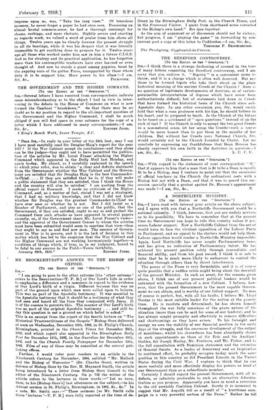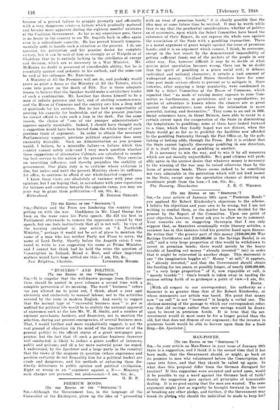A NORTHCLIFFE MINISTRY.
(To THE EDITOR Or THE " SPECTATOR.")
Sra,—I have read with interest your article on the above subject. and I agree with you that a Northcliffe Government would be a national calamity. I think, however, that you are unduly nervous as to its possibility. We have to remember that at the present time no Government can hope to rule this country unless it pos- sesses Labour support. Now a Northcliffe Cabinet from the outset would have to face the virulent opposition of the Labour Party in Parliament, and an appeal to the electors would not help them. Labour opposition would render a Northcliffe Ministry impossible. Again, Lord Northcliffe has never sought Parliamentary fame, and has given no indication of Parliamentary talent. He has achieved his present position solely through journalistic and financial ability, and from his past record, I think it is safe to infer that he is much more- likely to endeavour to control the situation through others than by direct interference.
The power of the Press is very formidable, and it is of course quite possible that a sudden crisis might bring about the downfall of the present Ministry. In such an event, for the reasons given above, I think one of our present political leaders would he entrusted with the formation of a new Cabinet. I believe, how- ever, that the present Government is the most capable Govern- ment we can obtain, and is worthy of our fullest support. No man of course is perfect, but, with all his faults, I believe Mr. Lloyd George is the most suitable leader for the nation at the present time. He is resolute and determined; he has shown himself throughout the war fully conscious of the grave nature of the situation (more than can be said for some of our leaders); and he has always sought promptly and effectively to remove difficulties and shortcomings as they have arisen. To his foresight and energy we owe the stability of our financial position in the early days of the struggle, and the enormous development of the output of munitions; whilst his shrewdness has been abundantly shown in such appointments as those of Sir Eric and Sir Auckland Geddes, Sir Joseph Maclay, Mr. Prothero, and Mr. Fisher, and in the full consultation with Dominion statesmen and the retention of General Smuts. As a leader of democracy and an inspiration to continued effort, he probably occupies to-day much the same position in this country as did President Lincoln in the United States during the Civil War. I venture to think that he call more usefully and more effectively display his powers as head cf our Government than as a subordinate member.
Certainly I should regard the present Government, with all its defects, as infinitely preferable to such an alternative Adminis- tration as you propose. Apparently you have in mind a reversion to the old unwieldy Coalition Cabinet. Surely it is incorrect to suggest that Mr. Asquith fell as a result of " a hurricane cam- paign in a very powerful section of the Press." Rather he fell because of a proved failure to grapple promptly and efficiently with a very dangerous crisis—a failure which gradually matured and became more apparent during the eighteen months' existence of the Coalition Government. As far as my experience goes, there is no desire in the country to see Mr. Asquith back in office again even in a subordinate capacity. He has proved himself tempera- mentally unfit to handle such a situation as the present. I do not question his patriotism and his genuine desire for complete victory, but it can be said of him as strongly as of Walpole or of Gladstone that he is entirely lacking in the attributes of energy and decision, which are so necessary in a War Minister. Mr. McKenna no doubt is possessed of considerable ability, but he is essentially narrow and pedantic in his outlook, and the same can be said of his colleague Mr. Runciman.
A Ministry of All the Premiers will not do, and probably would prove as treat a fiasco as the Ministry of All the Talents, which came into power on the death of Pitt. Nor is there adequate reason to believe that the Speaker would make a satisfactory leader of such a combination. Mr. Lowther has shown himself to be a man of infinite patience and tact, and of sterling common-sense, and the House of Commons and the country owa him a deep debt of gratitude for his services. But he has had no opportunity of proving his capacity for leadership, and at the present juncture we cannot afford to take such a leap in the dark. For the same reason, the choice of "one of our younger administrators" appears equally unsuitable. Indeed, I should have thought such a suggestion would have been barred from the whole tenor of your previous train of argument. In order to obtain the necessary Parliamentary support, previous political experience does seem eminently desirable. Such an Administration as you propose would, I believe, be a miserable failure—a failure which this country cannot safely risk—and I very much question whether these suggestions of alternative Cabinets are calculated to render the best service to the nation at the present time. They exercise an unsettling influence, and thereby prejudice the stability of government. Our plain duty is to criticize where criticism is due, but unless and until the present Ministry shows its unfitness for office, to continue to afford it our whole-hearted support.
I know these views are absolutely at variance with your own opinions, but I am hoping that, in accordance with your reputation for fairness and courtesy towards the opposite camp, you may see your way to grant them publication.—I am, Sir, &c.,



































 Previous page
Previous page